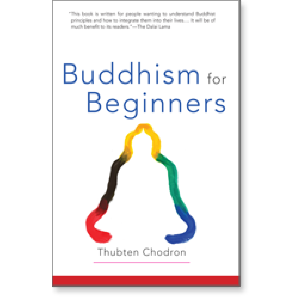| The following article is from the Winter, 2001 issue of the Snow Lion Newsletter and is for historical reference only. You can see this in context of the original newsletter here. |

I had been in Singapore just a few days when a young man appeared at my door. Can I ask you some questions about Buddhism? he queried. We sat down and began to talk. Some of his questions were those also asked by Westerners new to Buddhism. Others were unique to Asians who had grown up in societies where Buddhism and the old folk religions were often mixed, at least in the minds of the general population. As I began teaching in Singapore, I noticed that many people had the same questions.
Soon thereafter, another man came to see me, and in the course of our discussion he said, We need to hear about the Buddha's teachings in everyday English, a clear explanation without a lot of Pali and Sanskrit terms that we don't understand. Please write a book that will help us. In Singapore, we have the tradition of publishing Buddhist books for free distribution. I'd like to contribute so that you can write a book.
As luck (i.e., karma) would have it, without my asking someone gave me a computer. I just thought this would be useful to you, she said. So I got the hint and began writing. I'd never thought of writing a book, principally because all my English papers in high school and college had come back covered with red ink from my professors' pens. Nevertheless, I began to type away, first writing down the commonly asked questions I had heard and then soliciting from students other questions and topics about which they were curious. Having collected a sizable number of questions, I set about responding to them, and to ensure that my responses corresponded to the Buddha's teachings, gave the manuscript to several trusted Dharma friends to read and comment upon.
The book was initially published in Singapore in 1988 with the title I Wonder Why. It was a big hit, and Amitabha Buddhist Centre quickly had to reprint it several times. Much to my surprise, the book benefited people in a way I hadn't anticipated. Even today, when I visit Singapore, people come up to me and thank me for writing that book. It clarified so many of my doubts and explained Buddhist principles clearly and simply, they say. Over the years, I've collected additional questions and added new chapters on topics such as socially engaged Buddhism, emotions, and family. Buddhism for Beginners is the result.
Asking questions is healthy. It enables us to clarify doubts and gain new information. Many people have similar questions, and asking our questions is generally appreciated by fellow students who are too shy to ask!
Nevertheless, spiritual practice is more about holding questions than finding answers. Seeking one correct answer often comes from a wish to make lifewhich is basically fluidinto something certain and fixed. This often leads us to rigidity, closed-mindedness, and intolerance. On the other hand, holding a questionexploring its many facets over time-puts us in touch with the mystery of life. Holding questions accustoms us with the ungrasp- able nature of life and enables us to understand things from a broad range of perspectives. Thus, although answers are seemingly given to questions in this book, we must contemplate both, turning them over again and again so we see them from many sides and integrate them into our lives.
Buddhism for Beginners is designed for people who are interested in Buddhism as well as those who have studied or practiced it for years and still wonder about various points. The way some of the initial material on Buddhism was translated decades ago has led to misinterpretations even among those who teach Buddhism at the high school and college levels. I hope that this book will help those teachers and their students.
His Holiness the Dalai Lama kindly wrote the foreword. Chapters cover topics such as the essence of Buddhism; who is the Buddha; love and compassion; meditation; impermanence and suffering; selflessness and emptiness; science, rebirth, and creation; karma; dying, death, and the intermediate state; Buddhist traditions; Vajrayana; steps along the path; working with emotions; Dharma in daily life; social activism and ethical issues; women and the Dharma; monks, nuns and lay practitioners; spiritual teachers; family and children; shrines and offerings; prayer, ritual and dedication.


